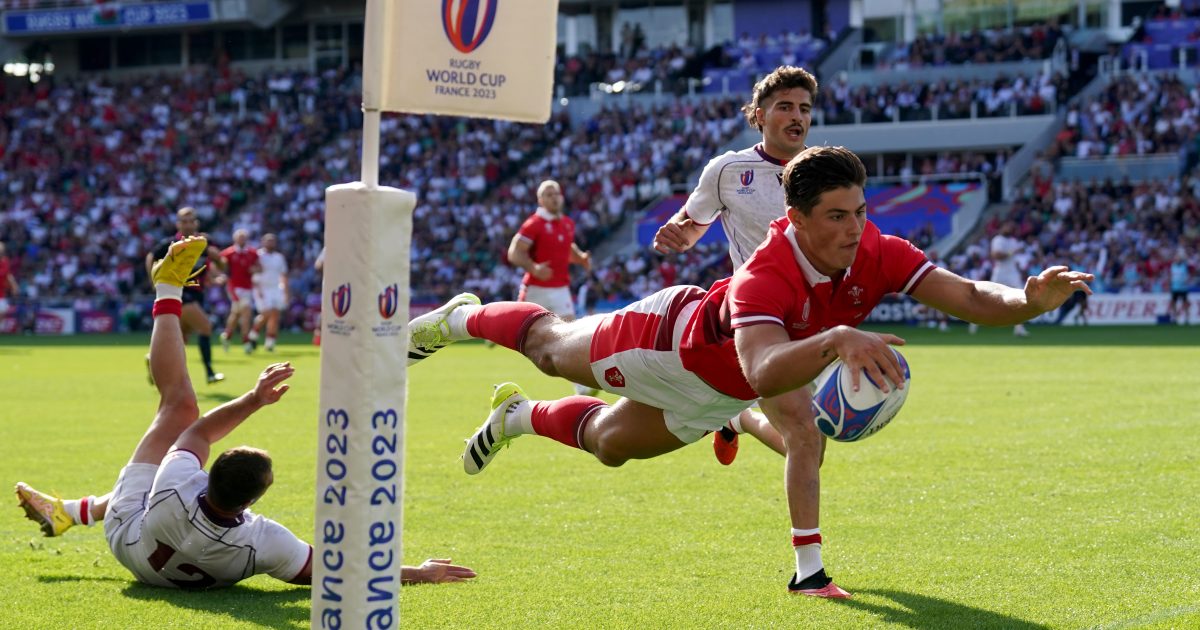Rees-Zammit assure la victoire des Gallois contre la Géorgie

Quatrième victoire de rang pour le Pays de Galles qui a battu la Géorgie 43-19 pour son dernier match de la Poule C à Nantes samedi 7 octobre. Sa place en quart de finale était déjà acquise depuis une semaine, mais cette victoire contre une équipe qui l’avait battu lors de leur dernière confrontation (13-12 en 2022 à Cardiff) a permis aux Gallois d’engranger de la confiance pour la suite.
Malgré une belle remontée à cinq points d’écart au début de la seconde période, la Géorgie n’a pas pu réitérer l’exploit.
La performance des Gallois n’était pourtant pas assurée avec le forfait en dernière minute de l’ouvreur Gareth Anscombe qui s’est plaint d’une douleur à l’aine pendant l’échauffement. Celui qui remplaçait Dan Biggar, blessé, a lui-même été remplacé par Sam Costelow (22 ans, 8 sélections). Celui-ci a dignement relevé le défi, passant treize points au pied (un seul échec) et assurant la passe qu’il fallait à l’arrière Liam Williams pour marquer le deuxième essai des Gallois (22e).
Ouverture du score par le Pays de Galles
Le pilier droit Tomas Francis avait réussi à passer par un trou de souris pour débloquer le tableau d’affichage après un quart de jeu et une séance de pilonnage face à des Géorgiens qui prenaient à cœur le défi physique relativement équilibré que proposait la rencontre. Le trois-quarts centre Merab Sharikadze parvenait à réduire l’écart au pied des poteaux (35e) avant la pause (17-7).
Malgré un ballon perdu face à Louis Rees-Zammit qui leur sera fatal après huit phases de jeu (42e), les Géorgiens ont entamé une belle remontée avec deux essais coup sur coup après une touche, par le talonneur de Montpellier Vano Karkadze (58e), puis par l’ailier du LOU Davit Niniashvili (61e) trois minutes plus tard. Un essai refusé de l’ailier Aka Tabutsadze aurait même pu les faire passer devant au score pour la première fois.
Coup de chaud
Mais avec seulement cinq points d’avance, ça commençait à sentir le roussi pour les Gallois et la tension était palpable. Malgré le doublé de Rees-Zammit (66e), les esprits s’échauffaient et aussi bien Taine Basham que Niniashvili étaient invités à aller se calmer dans leur coin pour dix minutes. Un ultime essai de George North (79e) bouclera la victoire.
Malgré cette performance, la Géorgie termine une campagne de Coupe du Monde de Rugby décevante sans aucune victoire à la clé pour la première fois depuis son premier tournoi en 2003. Les Lelos étaient condamnés à finir à la 4e place de la Poule C et devront donc en passer par le processus de qualification pour espérer figurer à la Coupe du Monde de Rugby 2027 en Australie.










